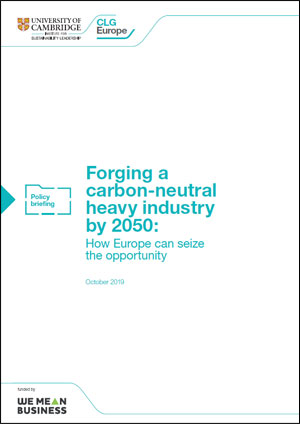3 October 2019 – As momentum gathers behind a long-term vision for a climate-neutral economy by 2050, increasing attention is being directed to sectors of the economy that are difficult to decarbonise, including heavy industry.
Energy-intensive sectors associated with materials and machinery production such as oil, mining, shipbuilding, steel, chemicals and machinery, play a central role in the European economy, and its decarbonisation is essential if Europe’s climate goals are to be achieved.
This briefing synthesises some of the latest thinking around the challenges and opportunities involved in decarbonising European heavy industry. It brings together the key findings from recent reports on industrial transformation, such as those by Material Economics and the Energy Transitions Commission, on what is technologically possible and financially feasible. It also synthesises the associated policy-focused reports on how policymakers at national and European level can support businesses in this transition, in particular through the forthcoming industrial strategy for Europe and Europe’s long-term strategy on climate.
Throughout the report, case studies are used to highlight how leading companies are innovating in segments of material-intensive value chains to move them and their businesses towards carbon neutrality.
This briefing sets out four key approaches to reduce industrial emissions to net-zero by 2050:
- Efficient use of carbon-intensive materials
- High-quality materials recirculation using renewable energy
- New production processes
- Carbon capture and use/storage (CCUS)
This briefing advises businesses to work to adopt these approaches. To support them policymakers should:
- Create strategic clarity and direction including on areas like the deployment of CCUS, biomass and hydrogen
- Support innovation and the deployment of new solutions
- Work to unlock investment and provide financial support for these approaches
- Provide the incentives to create market demand – including through carbon pricing
- Embed circularity within industrial and wider policies
- Align energy and other infrastructure plans to support this transition.
CLG Europe is a select group of leading European businesses, with a membership representative of Europe in both geography
and sector. CLG Europe members have come together to work with policymakers and business peers to support stronger ambition and effective, accelerated action on climate change within the EU and globally. The group’s work is aligned with the Paris Agreement and in support of the Sustainable Development Goals (SDGs).
CLG Europe is the sister group of UK-focused The Prince of Wales’s Corporate Leaders Group, which has frequently defined the British business response to climate change.
The guiding mission of CLG Europe is to develop credible, ambitious positions amongst its membership and deploy effective strategic communications, thinking and action to engage with the highest levels of policy audiences and the wider business community. It acts to strengthen climate change policy and drive it into practice, both in Europe and, working with others, around the world.
CLG Europe is convened by the University of Cambridge Institute for Sustainability Leadership (CISL).
Citing this briefing
Please refer to this publication as University of Cambridge Institute for Sustainability Leadership (CISL). (2019). Forging a carbon-neutral heavy industry by 2050: How Europe can seize the opportunity, Cambridge, UK: CLG Europe.






